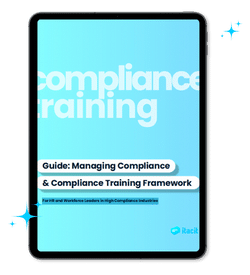Is your organization equipped to meet the changing needs of regulatory compliance?
Whether you’re in the healthcare sector, the insurance industry, transportation, or the financial world, regulations and industry standards are increasingly complex and more strictly monitored.
Your entire staff needs to know the where, what, and how of compliance. The risk of falling out of compliance is too high. A robust compliance training strategy can protect your organization, minimize risk, and contribute to a sustainable workplace culture.
So why do we need compliance training? It will safeguard your organization’s reputation, protect worker safety, and promote company-wide accountability.
Keep reading for our comprehensive guide answering why compliance training is important.
What is Compliance Training?
Compliance training educates employees on the laws, regulations, and ethical standards pertinent to their roles.
It covers a broad spectrum, including industry-specific regulations and general workplace policies, that lay the foundation for an organizational culture of integrity and safety.
Why is Compliance Training Important?
Straightforward answer to the question why compliance training is important is that it ensures that employees understand and adhere to the rules. It serves as a strategic educational program outlining guidelines that help the organization operate ethically and within the law. This training is essential for shaping a responsible workforce that understands its duties and acts with accountability.
From a legal perspective, compliance requirements can vary significantly based on location and industry. Ensuring that employees are well-trained addresses unique operational intricacies within your organization. From a safety standpoint, compliance training best prepares all workers to minimize errors and potential injuries, while also providing a structured approach for addressing situations if they arise.

Examples of Compliance Training
To illustrate the different types of compliance training, let’s take a look at a few real-world examples.
Healthcare Training
In healthcare organizations, various types of training are essential to uphold regulatory compliance and ensure top-notch patient care. These include:
- Patient Confidentiality Training: Focuses on educating healthcare professionals about the importance of maintaining patient privacy and confidentiality in accordance with the regulatory bodies.
- Infection Control Training: Addresses protocols and best practices to prevent the spread of infections within healthcare settings, emphasizing the importance of maintaining a safe and sterile environment.
- Ethical Decision-Making Training: Guides medical professionals in navigating ethical dilemmas commonly encountered in healthcare, leading to a culture of responsible and morally sound decision-making.
Workplace Safety Training
Within the realm of compliance-focused workplace safety training, organizations often provide specialized instruction to ensure adherence to regulatory standards. Here are key compliance-related training areas:
- Safety and OSHA Compliance Training: Safety training educates employees on specific safety standards and practices relevant to their industry, reducing the risk of legal non-compliance.
- Personal Protective Equipment (PPE) Compliance Training: Focuses on the proper selection, use, and maintenance of personal protective equipment, ensuring that employees comply with industry-specific guidelines and regulatory requirements for enhanced workplace safety.
- Environmental Compliance Training: Addresses regulations related to environmental safety and sustainability, educating employees on proper waste disposal, pollution prevention, and other measures to ensure compliance with environmental laws and standards.
Diversity and Inclusion Training
It’s great to see the positive trend of the growing emphasis on inclusion and diversity training. Compliance training in this field is designed to promote an inclusive workplace culture. Here are a few specific areas covered in diversity compliance training:
- Cultural Sensitivity and Sexual Harassment Training: Aims to enhance employees’ understanding and appreciation of different identities and cultures, developing an environment where diverse backgrounds are respected and celebrated, and all people are treated equally
- Anti-Discrimination Compliance: Focuses on legal requirements and company policies to prevent discrimination based on factors such as race, gender, age, and other protected characteristics, promoting fair treatment for all employees.
- Inclusive Communication Training: Guides employees on inclusive communication practices, emphasizing language and behaviors that promote a diverse and welcoming workplace, ensuring compliance with anti-bias principles.
Data Protection and Privacy Training
As our digital landscape continues to evolve, safeguarding sensitive information becomes increasingly critical. Compliance training in data protection and privacy is tailored to instill essential knowledge and practices. Here are key components covered in data protection and privacy compliance training:
- Confidentiality Obligations: Educates employees on the significance of maintaining the confidentiality of sensitive information, emphasizing legal obligations and organizational policies.
- Understanding Data Breach Risks: Provides insights into potential risks and consequences of data breaches, empowering employees to recognize and mitigate vulnerabilities, ensuring compliance with privacy regulations.
- Legal Framework and Compliance Standards: Covers relevant data protection laws and compliance standards, ensuring employees are well-versed in the legal requirements governing the handling of personal and sensitive data.
- Secure Data Handling Practices: Guides employees on best practices for securely handling, storing, and transmitting data, reducing the likelihood of data breaches and ensuring compliance with privacy protocols.
- User Accountability and Responsibility: Reinforces individual responsibility in maintaining data integrity, promoting a culture of accountability, and ensuring compliance with privacy policies and regulations.
10 Benefits of Compliance Training
Compliance training isn’t all about conforming to regulations and paperwork. There are distinct benefits to your organization directly telling you why compliance training is important:
- Reduced Risk of Non-Compliance: Compliance training acts as a shield, minimizing the risk of legal repercussions due to unintentional violations.
- Promotes an Inclusive and Safe Work Environment: By instilling a sense of responsibility, compliance training contributes to a workplace where everyone feels safe, respected, and valued.
- Defines Organizational Policies: It serves as a roadmap, ensuring every employee understands and adheres to organizational policies.
- Balances Ethics with Priorities: Good compliance training encourages ethical decision-making, aligning individual actions with organizational values.
- Boosts Company Reputation and Bottom Line: A commitment to compliance enhances an organization’s reputation, impacting its bottom line by attracting a wider range of customers and partners.
- Creates Evidence that Employees Received Training: In the face of legal action or audits, documented compliance training becomes crucial evidence, showcasing the organization’s commitment to adherence.
- Meeting Legal Requirements: Compliance training ensures the organization remains on the right side of the law, avoiding costly legal battles and penalties.
- Mitigating Corporate Risk: By educating employees on risk factors, compliance training helps organizations proactively address potential threats.
- Safety / Occupational Safety & Health Administration (OSHA) Training: Especially crucial in industries prone to physical risks, safety training ensures employees can maintain a safe working environment.
- Enhancing Ethical Decision-Making: Effective compliance training programs go beyond rules, encouraging ethical decision-making among learners in various situations.
How Does Compliance Training Influence Corporate Strategy?
Compliance training is seen throughout nearly every facet of an organization. Especially for those in highly regulated markets, compliance really is king. It’s essential that staff are fully trained, up-to-date, and aware of the importance of compliance.
For employees, it really needs to start from day 1.
Role of Compliance Training in Employee Onboarding
Building an Ethical Culture
During onboarding, compliance training sets the tone for a culture of integrity, creating a foundation for ethical decision-making from the start.
Institutionalizing Corporate Values
It plays a crucial role in embedding corporate values into the organizational DNA, ensuring alignment across all levels, departments, and regions.
How Compliance Training Contributes to Corporate Reputation
Enhancing Company Image
A strong commitment to compliance positively impacts how the organization is perceived, both internally and externally.
Building Customer Trust
Customers are more likely to trust and engage with businesses that prioritize compliance, knowing their transactions are safeguarded and conducted with integrity and transparency.

Role of Compliance Training in Employee Development
Providing Career Advancement Opportunities
Compliance training is not just about rules: it’s really a path for employees to develop professionally, opening doors to new opportunities within the organization. It goes hand-in-hand with other professional development, like learning new skills or new technologies.
Creating a Secure and Respectful Workplace Environment
Compliance training contributes to a workplace where employees feel secure, valued, and respected, ultimately increasing productivity and innovation.
Streamlining Compliance Training
The Role of Technology in Compliance Training
Technology, like Learning Management Systems (LMS), compliance training software and employee experience apps, makes compliance training much more accessible and engaging for learners.
When employees can perform required training whenever and wherever they want, your organization will see higher completion percentages and better knowledge retention.
Using a digital training solution also consolidates all compliance training documentation to one, centralized location. No more filing compliance certificates and course completion proof from various sources. Everything in one place makes proving compliance easy and efficient.
Different Learning Styles and Effective Training
Understanding different learning styles is integral to designing effective compliance training programs. By catering to diverse learner preferences and keeping training dynamic, organizations can enhance employee engagement and knowledge retention, creating more impactful training experiences.
One method to connect with learners in an experiential way is to use real-world examples and simulations. Real-life examples are a great way to bridge the gap between theoretical knowledge and practical application in compliance training. They provide learners with tangible scenarios, helping them grasp the relevance of compliance issues in their daily work.
Incorporating interactive elements, multimedia, and scenario-based learning can transform dry, regulatory training content into an immersive and effective learning experience.
Limit Potential Problems with Compliance Training
Mitigating Legal Consequences through Compliance Training
Legal consequences resulting from non-compliance can be detrimental to an organization. Compliance training acts as a proactive shield, reducing the risk of legal actions and creating a workforce that operates within the boundaries of the law.
Proactive Approach to Ethical Issues
Effective compliance training addresses the ethical dilemmas employees may face in their daily work. Harnessing a proactive approach to ethical issues will help organizations instill a workplace culture of responsibility and integrity.
Tailoring Training Sessions to Different Situations
Recognizing that different situations may require tailored approaches, compliance training should be flexible and adaptable. Customizing training sessions to address specific compliance topics relevant to different departments ensures a more targeted and impactful learning experience.
Effective Implementation of Corporate Compliance Training Programs
Creating Effective Compliance Programs for New Employees
For new employees, effective compliance training is crucial for getting up to speed and understanding the company culture. Tailoring training programs to the needs of new hires facilitates a smooth onboarding process, ensuring they grasp the necessary information from the start.
Understand the Role of L&D and HR Departments in Compliance Training
Learning and Development and Human Resource departments play a pivotal role in the successful implementation of compliance training programs. From designing courses to monitoring employee progress, these departments are leading the charge to ensure a compliant and ethical workforce.
Know About the Importance of Audit Trails in Compliance Training
Maintaining audit trails is essential for compliance training. It not only provides a record of training completion, but also serves as evidence in the event of legal challenges. The transparency offered by audit trails adds an extra layer of credibility to the compliance training program.
The most effective way to ensure a bullet-proof audit trail is to keep all compliance related training and documentation in a comprehensive employee platform.
Leveraging Technology for Effective Compliance Training
If your company isn’t already using one, the integration of an employee experience platform and LMS for employee training will be a game-changer for compliance training.
It streamlines the delivery of online courses, tracks employee progress, and ensures that training aligns with the latest regulatory requirements. Plus, it stores all compliance certifications and documentation in one place, removing a massive burden from tracking and auditing.
The Need for Effective Compliance Training
Now we know why compliance training is important. From risk management and ensuring legal compliance to building a positive corporate culture, the benefits of comprehensive compliance training are indispensable. Not only that, with increasingly strict regulations industry-wide, compliance training is no longer an option, it’s a must-have.
A proactive and adaptive approach, coupled with innovative best practices and technology integration, will help your organization navigate the challenges of an increasingly complex regulatory environment.
Contact us to find out more about how an integrated employee experience platform will safeguard your company’s reputation and enhance worker safety.
What types of compliance training are essential for an organization?
Essential compliance training includes healthcare compliance, workplace safety, diversity and inclusion, data protection and privacy, among others, tailored to the specific needs of the organization, industry, and region.
What role does technology play in compliance training?
Technology, including a powerful Learning Management System and interactive online training, makes compliance training more accessible, engaging, and efficient for learners.
Why do we need compliance training in employee onboarding?
Integrating compliance training materials into employee onboarding ensures that new hires understand and align with the legal and ethical standards upheld by the company from the very beginning. This integration lays the foundation for a responsible and compliant workforce.










